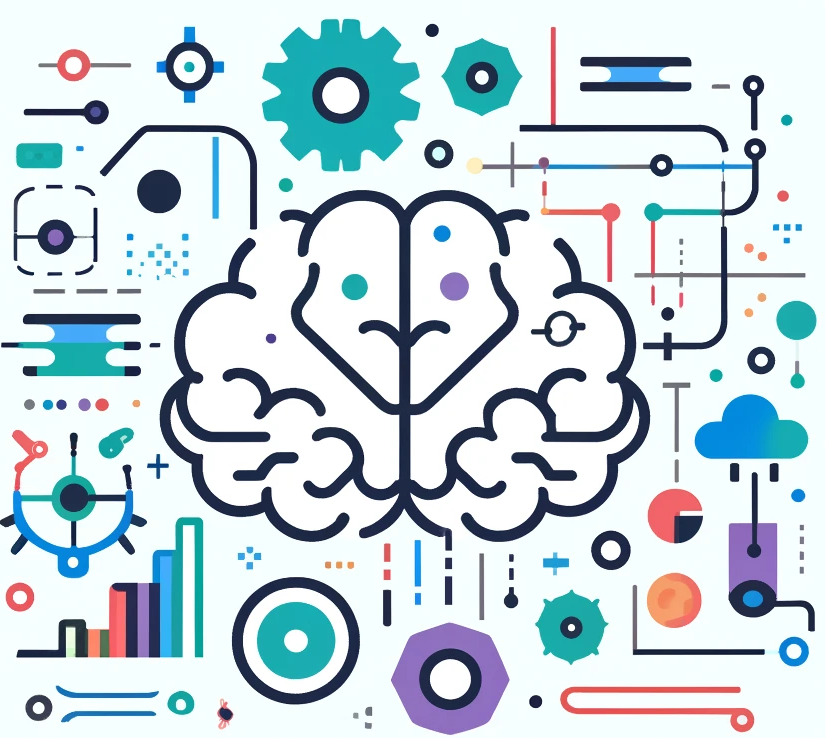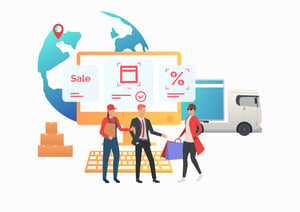Future Tech Trends: 5 Cognitive Technologies Shaping the Future

Introduction to Cognitive Technologies
Welcome to the exciting world of cognitive technologies, where futuristic advancements are reshaping our lives in ways we never thought possible. From artificial intelligence and virtual reality to robotics and biotechnology, these ground breaking innovations are revolutionizing industries across the globe. In this blog post, we will explore five key cognitive technologies that are shaping the future of technology and paving the way for a new era of possibilities.
The Impact of Artificial Intelligence
Artificial Intelligence (AI) has revolutionized the way we live and work, with its impact being felt across various industries. From personalized recommendations on streaming platforms to autonomous vehicles, AI is transforming our world in unimaginable ways.
One area where AI is making a significant impact is procurement. The ability of AI systems to analyze vast amounts of data and identify patterns enables organizations to make smarter purchasing decisions. By leveraging machine learning algorithms, companies can optimize their supply chains, reduce costs, and improve efficiency.
Additionally, AI-powered chatbots are streamlining customer support processes in the procurement industry. These virtual assistants can provide instant responses to common queries and help users navigate through complex procurement systems. This not only improves user experience but also saves time for both buyers and suppliers.
AI is also enhancing risk management in procurement by predicting potential disruptions in the supply chain. With real-time data analysis capabilities, organizations can proactively address issues such as supplier delays or quality defects before they escalate into major problems.
Furthermore, AI-driven predictive analytics enable organizations to forecast demand accurately, ensuring optimal inventory levels at all times. This helps prevent stockouts or overstocking situations that could negatively impact cash flow and profitability.
As advancements in AI continue at a rapid pace, it’s essential for professionals in the procurement field to stay updated with these emerging technologies. By harnessing the power of AI tools and solutions effectively, businesses can gain a competitive edge by making more informed decisions while saving time and resources.
Virtual and Augmented Reality in Various Industries
Virtual Reality (VR) and Augmented Reality (AR) have rapidly gained traction in various industries, transforming the way we perceive and interact with the world. These immersive technologies offer endless possibilities for enhancing productivity, improving customer experiences, and driving innovation across sectors.
In healthcare, VR/AR is revolutionizing medical training by providing realistic simulations for surgeons to practice complex procedures without putting patients at risk. It also offers therapeutic applications such as pain management and mental health treatments. In education, virtual reality allows students to explore historical landmarks or dive into scientific experiments that were once confined to textbooks.
The entertainment industry has embraced VR/AR as a means of creating truly immersive experiences for gamers and moviegoers alike. With VR headsets becoming more accessible, users can now step into virtual worlds where they can interact with characters or explore breath taking environments.
Retailers are leveraging AR technology to enhance the shopping experience by allowing customers to virtually try on clothes or visualize furniture in their homes before making a purchase decision. Architects and designers are using these tools to create interactive 3D models of buildings or room layouts, giving clients a better understanding of their designs.
Even industries like manufacturing and logistics are finding value in VR/AR technologies. They enable workers to receive real-time data overlays while performing tasks, reducing errors and increasing efficiency on factory floors. The use of AR glasses can also improve supply chain operations by providing visual cues during order picking processes.
The potential applications of virtual and augmented reality extend far beyond what we can currently imagine. As these technologies continue to advance, it’s important for businesses across all sectors to stay informed about the latest developments in order to remain competitive in an increasingly digital world.
Robotics and Automation
Robots and automation have revolutionized industries across the globe, changing the way we work and transforming the workforce. With advancements in technology, tasks that were once performed by humans are now being taken over by intelligent machines.
In manufacturing, robots are increasingly used to perform repetitive or dangerous tasks with precision and efficiency. They can work 24/7 without needing breaks or time off, resulting in increased productivity for companies. This has led to a shift in job roles, with humans moving into more skilled positions such as robot programming and maintenance.
Automation is not limited to just manufacturing; it is also making its presence felt in sectors like healthcare and logistics. Robotic surgery systems allow for precise procedures with minimal invasiveness, leading to faster recovery times for patients. In warehouses, automated systems can efficiently sort and package goods for delivery, reducing human error and speeding up order fulfillment.
While there are concerns about job loss due to automation, it also presents opportunities for new types of jobs. As machines take over mundane tasks, humans can focus on higher-level decision-making roles that require creativity and critical thinking skills.
However, there will still be a need for human intervention when it comes to complex problem-solving or situations that require empathy. Robots may excel at performing specific tasks but lack the ability to understand emotions or navigate unpredictable situations.
Robotics and automation are reshaping the workforce by augmenting human capabilities rather than replacing them entirely. It’s important for individuals to adapt their skills accordingly so they can thrive in this changing landscape of technology-driven workplaces.
The Growing Field of Biotechnology
Biotechnology is a rapidly evolving field that holds immense potential for shaping the future. By leveraging biological systems and processes, scientists are constantly finding new ways to solve complex problems and improve various industries.
In healthcare, biotechnology has already made significant advancements. From personalized medicine to gene editing techniques like CRISPR, researchers are revolutionizing the way we prevent, diagnose, and treat diseases. This means better outcomes for patients and more targeted therapies tailored to individual needs.
Agriculture is another sector benefiting from biotech innovations. Through genetic engineering, crops can be engineered to resist pests or tolerate harsh environmental conditions. This not only increases agricultural productivity but also reduces the need for harmful pesticides and herbicides.
Industrial biotechnology is also gaining momentum. Microorganisms can be used as “cell factories” to produce sustainable fuels, chemicals, and materials that have lower carbon footprints compared to traditional manufacturing methods. This contributes to a greener planet by reducing reliance on fossil fuels.
Moreover, biotech advancements extend beyond healthcare and agriculture; they have implications in areas such as renewable energy production, waste management solutions, and even consumer products like bio-based plastics.
However exciting these developments may be though it’s important we address any ethical concerns associated with them along the way – whether it’s regarding privacy issues in genetic testing or ensuring equitable access to life-changing therapies.
In conclusion – though there are still challenges ahead – the growing field of biotechnology offers incredible possibilities for improving our lives across multiple sectors. As scientists continue their ground breaking research in this area,
we must stay informed about these trends so we can harness their benefits while addressing any potential drawbacks responsibly
Ethics and Concerns Surrounding Cognitive Technologies
As we dive deeper into the world of cognitive technologies, it becomes crucial to address the ethical implications and concerns that arise from their widespread adoption. One key concern is privacy. With advancements in artificial intelligence and data analytics, our personal information is being collected and analyzed on a massive scale. This raises questions about who has access to our data and how it is being used.
Another area of concern relates to bias in cognitive technologies. As these systems rely on algorithms trained with large datasets, they can unintentionally perpetuate biases present in the data itself. This can result in discriminatory outcomes or reinforce existing inequalities.
The impact on employment is another pressing issue surrounding cognitive technologies. While these technologies have the potential to automate repetitive tasks and increase efficiency, there are concerns about job displacement and unemployment rates rising as a result.
Additionally, there are ethical considerations when it comes to using cognitive technologies in areas such as healthcare or criminal justice. For example, relying solely on AI-driven diagnosis could lead to errors or misdiagnosis if human judgment is completely removed from the equation.
Furthermore, there are broader societal implications of relying heavily on cognitive technologies for decision-making processes. It raises questions about accountability and responsibility when machines make choices that affect individuals or communities.
While there are immense benefits associated with cognitive technologies, it’s essential to navigate these issues responsibly by addressing privacy concerns, mitigating biases within algorithms, reimagining workforce dynamics,and ensuring transparent decision-making processes. Keeping an open dialogue around ethics will be crucial as we shape a future driven by technology!
Conclusion: The Importance of Keeping Up with Future Tech Trends
As we have explored the various cognitive technologies shaping the future, it becomes evident that staying informed and adapting to these advancements is crucial for individuals and businesses alike. Procurement professionals, in particular, need to pay attention to how these technologies are transforming their industry.
Artificial intelligence has revolutionized data analysis and decision-making processes in procurement. By harnessing AI-powered algorithms, organizations can gain valuable insights from vast amounts of data, optimize supply chainsoptimize supply chainsing accuracy, and enhance supplier management.
Virtual and augmented reality offer immersive experiences that enable procurement teams to visualize products or explore virtual marketplaces before making purchasing decisions. These technologies can streamline the sourcing process by reducing costly physical prototypes and allowing stakeholders to collaborate remotely.
Robotics and automation are reshaping the workforce in procurement by automating repetitive tasks such as purchase order processing or inventory management. This frees up time for Procurement professionals to focus on strategic activities like relationship-building with suppliers or negotiating better contracts.
The field of biotechnology is expanding rapidly with applications ranging from sustainable materials sourcing to genetic engineering for improved crop yields. Understanding these developments will be crucial for procurement professionals involved in industries such as agriculture or pharmaceuticals.
While embracing cognitive technologies brings numerous benefits, there are ethical considerations that must be addressed. Data privacy concerns arise when handling large volumes of personal information through AI systems. Additionally, job displacements due to automation raise questions about retraining opportunities and ensuring a fair transition for workers.

